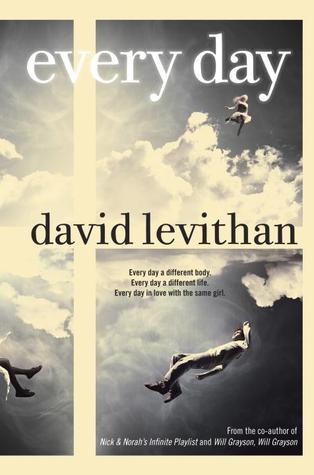Every day, for his/her existence, A wakes up in a different body of someone nearby of the same age. For that day, A can access that person’s memories, sleeps in their bed, kisses their girlfriends or boyfriends (or not), and then at midnight, a new life. Each chapter is a day, and each day has more meaning when for the first time, A falls in love and can’t help but use each subsequent day-in-the-life to reach out to Rhiannon.
I have two things to say about David Levithan’s Every Day.
1. I am super-duper excited that this book is Levithan’s long deserved day in the sun, what with full-page Entertainment Weekly reviews and the attention of the mainstream reading community. He has been writing excellent YA for years and is deserving of praise.
I enjoyed Every Day a great deal, especially how effortlessly Levithan creates the worlds of so many varied teenagers in so few pages. However, I think that some of Levithan’s other books explore the nuances of young relationships and love with a bit more subtlety. If you are new to Levithan and looking for more, might I recommend Are We There Yet?, Marly’s Ghost, or my absolute favorite, The Realm of Possibility.
2. So, about that Day 6025.
The short of it (not news for most of you), on Day 6025, A wakes up in the body of an obese teenager. A has never been obese before, never existed in a body of that size, and he reacts with immediate negative, offensive language. This is not a flattering or sensitive portrayal of life that is reality for many, many Americans and young people.
However, I can see the literary purpose of Levithan’s choice to set A against his body – this is a point in the novel when A wants to make a relationship work with Rhiannon, but in this less attractive body, Rhiannon finds it harder to see A inside, to see why it’s worth the effort to date a non-bodied entity. A is scared of this potential hurdle from the get-go – he/she is always A, but he has no control over any given corporeal appearance. And the feeling of being in a body that doesn’t feel the way your body should feel is uncomfortable. I get that.
But I don’t think this excuses the level of vitriol in Levithan’s language. It really was jarring even for me – a generally sympathetic, easy-going reader. I don’t know if it’s the author’s responsibility to make artistic changes in order to please every subset of people, but it seems that this chapter could have been written to the same effect with maybe half of the negative language, without the stereotypical perceptions of overweight people. It sucks that this one chapter has ruined the reading experience for so many.
